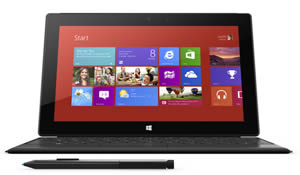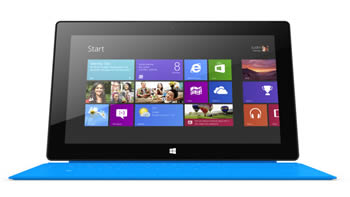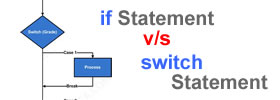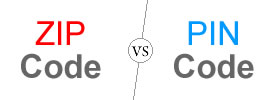Difference between Microsoft Surface Pro and Microsoft Surface RT
Key difference: At the time of its release, the Microsoft Surface was touted as the perfect cross between a tablet and a laptop. It was initially released February 2013. The Microsoft Surface Pro features a 10.6-inch ClearType HD screen with approximately 208 ppi pixel density. The screen is full HD, a feature not readily avilable in most tablets. The device runs Microsoft Windows 8, which the same OS that is being run in various laptops and desktops. The device has Full Windows capability. It can practically run all Windows programs, including games. The Microsoft Surface RT is a tablet that features a 10.6-inch TFT HD capacitive touchscreen with approximately 148 ppi density. The tablet runs on the Windows RT OS, which has a huge lacking feature. The OS is not compatible with old Windows PC programs such as VLC, Photoshop Elements, etc.
 Today is the world of smartphones and tablets. So, much so that tablets and smartphones are attempting to replace the traditional and bulky desktops and laptops. The Microsoft Surface is a series of tablets that aim to do just that. The advantage that the Surface has over a number of other tablets is that it will run the Microsoft Windows operating system, whereas most other tablets run Android. The iPad runs the iOS which is more similar to the iPhone OS rather than a Mac OS. Hence, at the time of its release, the Microsoft Surface was touted as the perfect cross between a tablet and a laptop. It was initially released February 2013.
Today is the world of smartphones and tablets. So, much so that tablets and smartphones are attempting to replace the traditional and bulky desktops and laptops. The Microsoft Surface is a series of tablets that aim to do just that. The advantage that the Surface has over a number of other tablets is that it will run the Microsoft Windows operating system, whereas most other tablets run Android. The iPad runs the iOS which is more similar to the iPhone OS rather than a Mac OS. Hence, at the time of its release, the Microsoft Surface was touted as the perfect cross between a tablet and a laptop. It was initially released February 2013.
The Microsoft Surface Pro features a 10.6-inch ClearType HD screen with approximately 208 ppi pixel density. The screen is full HD, a feature not readily avilable in most tablets. The screen affords the true 16:9 aspect ratio which matches most movies and shows, eliminating the black bars that pop up. The Microsoft Surface Pro also has a 10 point multi-touch.
Microsoft Surface Pro is powered by a Dual-core 1.7 GHz Intel Core i5-3317U processor, which is backed by 4 GB of RAM. It also features two cameras, a front-facing and a rear-facing. Both are 720p HD LifeCams with True Color.
The device runs Microsoft Windows 8 Professional, which the same OS that is being run in various laptops and desktops. The device has Full Windows capability. It can practically run all Windows programs, including games.
The device comes in three memory size variants: 64 GB, 128 GB and 256 GB. However, the actual memory storage available for the user is 23GB for the 64 GB variant and 85GB for 128 GB variant. The actual user memory available for the 256 GB is not currently specified. The size disparency is because of the system backup storage recovery partition, which can be manually deleted by experiences users.
The input devices for the Microsoft Surface Pro includes an on screen keyboard, a physical keyboard that doubles as a cover, as well as a pen stylus. The physical keyboard can be purchased separately or as part of a combo with the device itself. It attaches magnetically and electrically to the base of the tablet.
Physically, the device is quite similar to the Microsoft Surface RT, same look, and same color. However, it is thicker than the RT and has a full USB 3.0 port, in addition to a Micro-HDMI port, microSDXC card slot, Headset jack, Mini DisplayPort and Cover port. Similar to RT, it also has a built in kickstand, which has been critized by some as beinf too difficult to manage. Additionally, Microsoft has also acknowledged issues with the stylus pen. The stylus pen has been reported by some users as randomly not working correctly, especially with older applications that do not have complete pen support. There have also been some reported issues with Wi-Fi and while waking up from standby mode.

The Microsoft Surface RT is a tablet that features a 10.6-inch TFT HD capacitive touchscreen with approximately 148 ppi density. The screen is pretty decent in terms of resolution and shows clear, sharp images. The screen affords the true 16:9 aspect ratio which matches most movies and shows, eliminating the black bars that pop up. The tablet runs on the Windows RT OS, which has a huge lacking feature. The OS is not compatible with old Windows PC programs such as VLC, Photoshop Elements, etc. This is one of the reasons for the tablet not being so popular even after the amazing design and other attractive features. In order to run the old PC programs, one would require Windows 8 with an Intel processor, which is offered in the Microsoft Surface Pro.The Microsoft Surface RT was launched in November 2012.
The device has a slab form that makes it look thicker and heavier than it actually is. The device is only 9.4 mm thick, same as the iPad; however, the slab form that has not been tapered towards the end makes it seem thicker. The tablet is a little heavier compared to other devices because of the extra inches on the screen. The device is quite slick, which makes it easier to grip but more prone to slipping through the fingers. The device comes with a built-in kickstand that helps it stay upright when placed on a surface. The device is covered in a VaporMg casing, which according to the company, makes the device scratch and water-resistant. The device also has an intriguing feature, which is a cover that doubles as a keyboard. The sleek and flat keyboard has an aesthetic appeal and is also productive.
On top of the device when facing front in landscape mode, there is an ambient light sensor along with the front facing 1.2 MP camera. On the bottom bezel is the Windows Home sensor that takes the user to the start screen or the last app accessed. On the right side of the device, there is a speaker grille, a Micro-HDMI port, a full USB 2.0 port, and the power port. The left side has an additional speaker grille, a headphone jack, and a volume rocker. The kickstand is said to be a bit difficult for some people, while other claim that the stand was pretty smooth and easy to access. Under the stand, resides the microSD port, while there are magnets on the bottom to attach the Touch and Type keyboard covers. The device also has a 1.2 MP rear camera, in case anyone would like use it take photos.
The tablet is powered by a 1.3 GHz Quad-core Cortex-A9 and comes in 32 and 64 GBs variants. The device feature 2 GB RAM. The processor provides enough power to allow the swiftly shifting between apps and windows. The tablet supports 802.11 a/b/g/n Wi-Fi support, Bluetooth 4.0, a gyroscope, an accelerometer, and a built-in compass, but no GPS. The device houses a 31.5 W-h battery that drained pretty quickly according to CNET. The main problem that comes with this device is that it is less of a tablet and more of an even more portable laptop. The design is obviously appealing, but in terms of features and price, maybe going for Microsoft Surface Pro.
The information for the detailed table about the two devices has been taken from the Microsoft website, Wikipedia and GSMArena.com.
|
|
Microsoft Surface Pro |
Microsoft Surface RT |
|
Launch Date |
February 2013 |
November 2012 |
|
Company |
Microsoft |
Microsoft |
|
Size |
275 x 173 x 13 mm |
274.6 x 172 x 9.4 mm |
|
Display |
10.6 inches ClearType HD screen |
10.6 inches TFT HD capacitive touchscreen |
|
Screen |
1920 x 1080 pixels (~208 ppi pixel density) 16M colors |
1366 x 768 pixels (~148 ppi pixel density) 16M colors |
|
Protection |
VaporMg casing |
VaporMg casing |
|
Weight |
910 grams |
680.4 grams |
|
2G Network |
N/A |
N/A |
|
3G Network |
N/A |
N/A |
|
4G Network |
N/A |
N/A |
|
GUI |
Windows 8 Pro |
Windows RT |
|
CPU speed |
Dual-core 1.7 GHz Intel Core i5-3317U |
1.3 GHz Quad-core Cortex-A9 |
|
GPU |
Intel HD Graphics 4000 |
ULP GeForce |
|
OS |
Windows 8 Pro |
Windows RT |
|
Chipset |
Intel Core i5 |
Nvidia Tegra 3 T30 |
|
RAM |
4GB RAM—Dual Channel Memory |
2 GB |
|
SIM Size |
N/A |
N/A |
|
Internal Memory |
64/128/256 GB |
32/64 GB |
|
Expandable Memory |
microSDXC card slot |
microSDXC card slot |
|
Sensors |
Ambient light sensor, Accelerometer, Gyroscope, Compass |
Accelerometer, Gyro, Compass, Ambient light sensor |
|
Connectivity |
Wi-Fi, Wi-Fi direct, Bluetooth, USB |
Wi-Fi, Wi-Fi direct, Bluetooth, USB |
|
Data |
WLAN, Bluetooth, USB |
WLAN, Bluetooth, USB |
|
Speed |
- |
- |
|
WLAN |
Wi-Fi (802.11a/b/g/n) |
Wi-Fi (802.11a/b/g/n) Wi-Fi Direct, dual-band |
|
Bluetooth |
Bluetooth 4.0 Low Energy technology |
Bluetooth v4.0 with A2DP |
|
USB |
Full-size USB 3.0 |
USB v2.0, USB Host support |
|
Primary Camera |
720p HD LifeCams with True Color |
1.2 MP |
|
Secondary Camera |
720p HD LifeCams with True Color |
1.2 MP |
|
Video |
720p @ 30fps |
720p @ 30fps |
|
Camera Features |
Geo-tagging |
Geo-tagging |
|
Sound Enhancement |
Microphone, Stereo speakers |
Two microphones, Stereo speakers |
|
Audio supported formats |
MP3/ WAV/ eAAC+ player |
MP3/ WAV/ eAAC+ player |
|
Video supported formats |
MP4/ DivX/ Xvid/ H.264/ H.263 player |
MP4/ DivX/ Xvid/ H.264/ H.263 player |
|
Battery Capacity |
42 W-h |
31.5 W-h |
|
Talktime |
- |
- |
|
Standby Time |
- |
- |
|
Available Colors |
Dark Titanium |
Dark Titanium |
|
Messaging |
Email, Push Email, IM |
Email, Push Email, IM |
|
Browser |
HTML5 |
HTML5 |
|
Radio |
No |
No |
|
GPS |
Yes |
Yes |
|
Java |
- |
- |
|
Additional Features |
Full-size USB 3.0 microSDXC card slot Headset jack Mini DisplayPort Cover port Ambient light sensor Accelerometer Gyroscope Compass Windows Mail and Messaging SkyDrive Internet Explorer 10 Bing Xbox Music Video, and Games. |
microSDXC card slot Headset jack HD video out port Cover port Built-in kickstand 5-point multi-touch Microsoft Office Home and Student 2013 RT Preview Windows Mail and Messaging SkyDrive Internet Explorer 10 Bing Xbox Music, Video, and Games |
Image Courtesy: microsoft.com









Add new comment